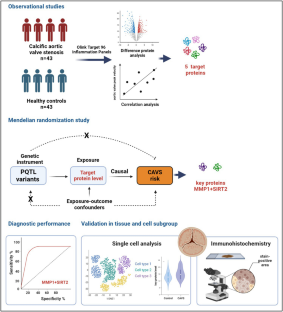Cardiovascular Toxicology ( IF 3.2 ) Pub Date : 2024-04-08 , DOI: 10.1007/s12012-024-09854-5 Rui Lin , Yuexin Zhu , Weiyao Chen , Zhiao Wang , Yuan Wang , Jie Du

|
Calcific aortic valve stenosis (CAVS) is characterized by increasing inflammation and progressive calcification in the aortic valve leaflets and is a major cause of death in the aging population. This study aimed to identify the inflammatory proteins involved in CAVS and provide potential therapeutic targets. We investigated the observational and causal associations of 92 inflammatory proteins, which were measured using affinity-based proteomic assays. Firstly, the case–control cohort identified differential proteins associated with the occurrence and progression of CAVS. Subsequently, we delved into exploring the causal impacts of these associated proteins through Mendelian randomization. This involved utilizing genetic instruments derived from cis-protein quantitative loci identified in genome-wide association studies, encompassing a cohort of over 400,000 individuals. Finally, we investigated the gene transcription and protein expression levels of inflammatory proteins by single-cell and immunohistochemistry analysis. Multivariate logistic regression and spearman's correlation analysis showed that five proteins showed a significant positive correlation with disease severity. Mendelian randomization showed that elevated levels of two proteins, namely, matrix metallopeptidase-1 (MMP1) and sirtuin 2 (SIRT2), were associated with an increased risk of CAVS. Immunohistochemistry and single-cell transcriptomes showed that expression levels of MMP1 and SIRT2 at the tissue and cell levels were significantly higher in calcified valves than in non-calcified control valves. These findings indicate that MMP1 and SIRT2 are causally related to CAVS and open up the possibility for identifying novel therapeutic targets.
中文翻译:

通过多重分析鉴定与钙化主动脉瓣狭窄相关的循环炎症蛋白
钙化性主动脉瓣狭窄(CAVS)的特点是主动脉瓣叶炎症增加和进行性钙化,是老年人群死亡的主要原因。本研究旨在鉴定参与 CAVS 的炎症蛋白并提供潜在的治疗靶点。我们研究了 92 种炎症蛋白的观察和因果关联,这些蛋白是使用基于亲和力的蛋白质组学测定进行测量的。首先,病例对照队列鉴定了与 CAVS 发生和进展相关的差异蛋白。随后,我们通过孟德尔随机化深入探索这些相关蛋白质的因果影响。这涉及利用源自全基因组关联研究中确定的顺式蛋白质定量位点的遗传仪器,涵盖超过 400,000 人的队列。最后,我们通过单细胞和免疫组织化学分析研究了炎症蛋白的基因转录和蛋白表达水平。多变量Logistic回归和斯皮尔曼相关分析显示,5种蛋白质与疾病严重程度呈显着正相关。孟德尔随机化显示,基质金属肽酶 1 (MMP1) 和 Sirtuin 2 (SIRT2) 两种蛋白水平升高与 CAVS 风险增加相关。免疫组织化学和单细胞转录组显示,钙化瓣膜组织和细胞水平的MMP1和SIRT2表达水平显着高于非钙化对照瓣膜。这些发现表明 MMP1 和 SIRT2 与 CAVS 存在因果关系,并为确定新的治疗靶点开辟了可能性。



























 京公网安备 11010802027423号
京公网安备 11010802027423号